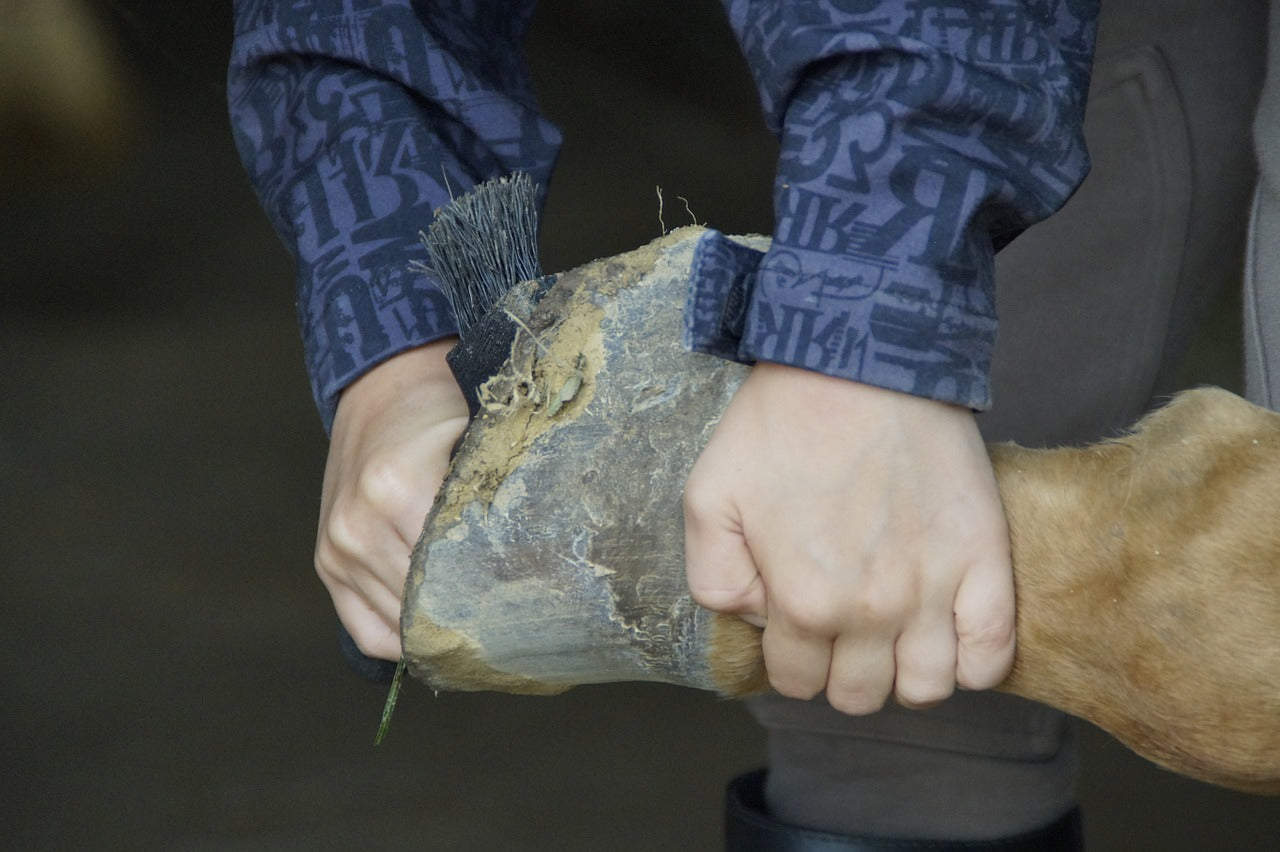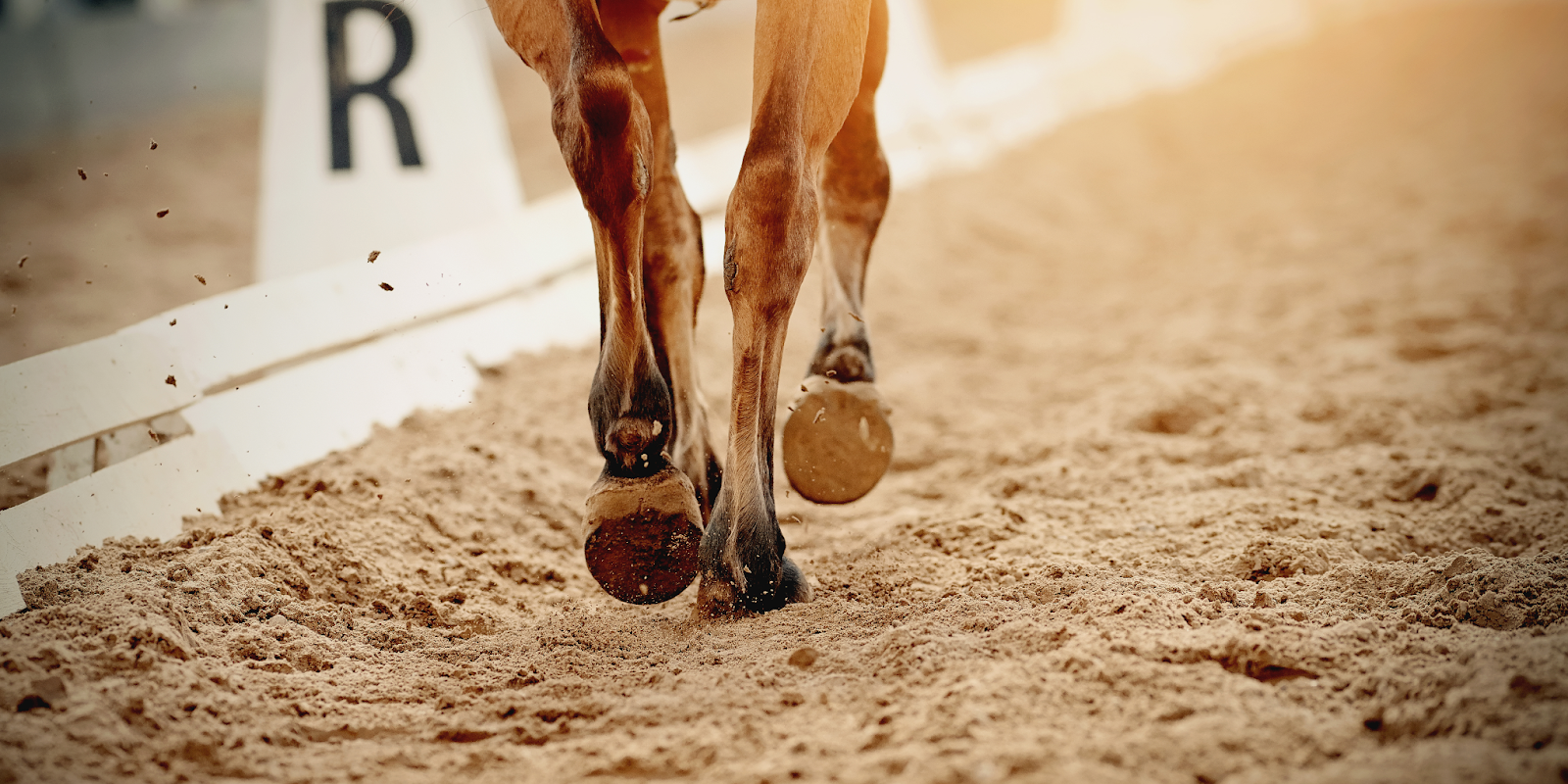Poor-quality hooves can be very problematic for the horse owner.
Hoof conditions can become so bad that the horse can be unable to compete due to lameness. Horses with problematic feet can have hooves that are dry, shelly, and prone to cracking or chipping. Hot, dry climates, in particular, can exacerbate hoof problems. Providing problem horses with a hoof supplement can often lead to healthy, better looking hooves, as well as help the horse remain sound. However, nothing will work overnight. Building stronger hooves can take 8 to 16 months of supplementation for full grow-out and replacement of the current hoof.
When considering hoof health and growth, there are many factors to evaluate, such as breed, metabolic rate, exercise, environmental temperature and moisture, and illness. For instance, hooves don' grow as fast in cold environments. In contrast, performance-related concussion increases hoof growth. It is important to good hoof health, however, that all horses have a good farrier program, proper health care (such as deworming and vaccinations), and proper nutrition.
If the horse is lacking energy, protein, certain amino acids, or particular vitamins or minerals, hoof health can be compromised. The first thing to ensure s that your horse is receiving adequate energy and protein. Ever noticed that if a horse is turned out of green grass, it seems that their hooves grow faster? This has to do with the horse's energy balance. If a horse's energy requirements aren't being met, it uses the protein in the feed as an energy source to help maintain a healthy weight, rather than incorporating structural proteins into a new hoof. Exercising horses, pregnant and lactating mares, and growing horses' total diet should consist of 14-16% high quality protein. High-quality sources of protein include alfalfa and soybean meal. A horse's hooves and hair are more than 90% protein. As you can see, proteins are the "building blocks" of the horse' ability to be competitive, let alone be sound.
If your horse has been receiving good-quality forage and a complete vitamin-mineral supplement for at least 8 months, along with the concentrate of your choice, and your horse's hooves are still not satisfactory, it is time to consider a hoof supplement. Along us, four nutrients are crucial to hoof growth: biotin, MSM, methionine, and zinc.
Biotin is a B-vitamin that is present in every cell in the body. It is essential for carbohydrate, fat, and protein metabolism, along with thyroid and adrenal function. Most importantly, biotin is crucial for repair and growth of skin and hooves. Research has shown that horses' hooves benefit from large oral doses of biotin, making it one of the few nutrients where more may actually be better. Biotin has been shown to improve the quality of the hoof (hardness, integrity, conformation, and tensile strength), but it does not increase the growth rate. In horses with improved hoof quality from biotin supplementation, in cases when supplementation ceased, growth after cessation regressed to the former state of the hoof. Providing your horse with 32 mg of biotin will help to strengthen their hooves. If you see improvement in your horses' hooves after 8 to 16 months of supplementation, they will need to remain on biotin for the rest of their useful lives to maintain that improvement. Cutting the dose is not advisable because it may affect the results.
Methylsulfonylmethane, better known as MSM, is an organic source of sulfur. Sulfur is important for the health of connective tissue and the production of keratin. Sulfur is critical to the production of crosslinks between collagen molecules, which adds strength to tendons, ligaments, and joint tissue. Keratin is a sulfur-dependent family of fibrous structural proteins, which are key components of hair and hooves. In order to produce keratin, sulfur must be present to produce cysteine disulfide linkages that form keratin. To ensure your supplement is helping to improve your horse's hoof strength, make sure your hoof supplement contains MSM.
Methionine is an essential amino acid that must be provided in the horse's diet. It is absolutely essential for the production of cysteine, which methionine is converted into. Cysteine makes up 24% of all the amino acids in keratin. As noted above, keratin is necessary for the production of protein in hair and hooves. Providing your horse with 2,500 mg of methionine will ensure that the hoof has an adequate amount of methionine to produce good-quality proteins to support its health.
Zinc is also a nutrient that is important for hoof quality and growth. Deficiencies in zinc can impede cellular division, protein synthesis, and growth and repair of connective tissue. In addition, it can depress utilization of amino acids and sulfur which, in turn, affects the hoof's ability to repair and growth in many ways. For these reasons, ensure that the hoof supplement you choose contains 150 mg of zinc.
Let me reiterate the importance of keeping your horse on a hoof supplement that contains all of the aforementioned components for 8 to 16 months before determining if your horse's hooves are in better shape than before supplementation. This is because it takes this long to completely replace and grow the entire new hoof wall. By growing the hoof from the inside out, you are ensuring better structure and longevity for your horse's hooves. A horse with good-quality hooves will be able to compete better and longer than a horse with hoof problems. No hoof, no horse.
Hoof supplementation, along with a good vitamin/mineral supplement, good quality hay, consistent horse health program, and good farrier will allow your horse's feet to improve and maintain healthy hooves throughout the rest of its career.






Leave a comment (all fields required)